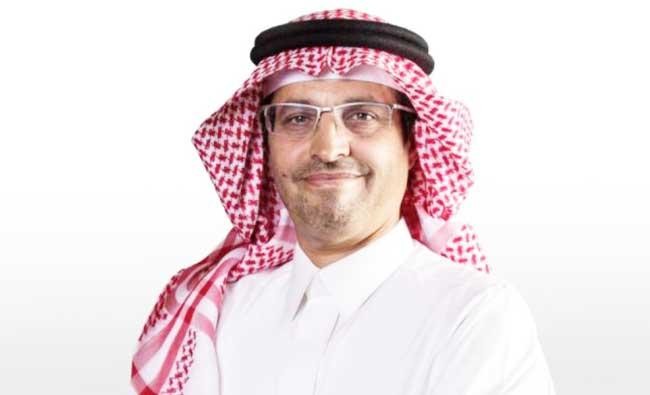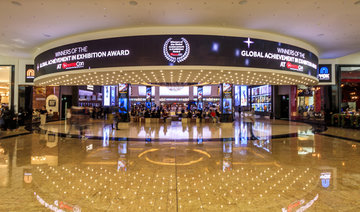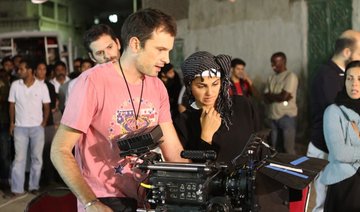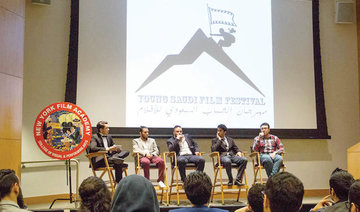RIYADH: The Saudi Film Council was launched on Tuesday to help develop the Kingdom’s cultural sector.
The launch by the General Culture Authority is the latest effort to establish and support new sectors that enhance society’s vitality and the economy’s diversity and prosperity, under the umbrella of the Kingdom’s Vision 2030.
The authority’s executive chairman, Ahmed bin Fahd Al-Mazeed, said the authority is determined to support cultural talents and the cultural diversity in the Kingdom.
He added the council aims to develop a vital sector and a thriving environment for the films and content industry in the Kingdom through strategic and sustainable development mechanisms.
This can be achieved by resorting to the sector’s main axes: Development and complete care of talents programs; supportive and flexible legislative and executive frameworks; advanced infrastructure and technology for artistic production; availability of financing solutions and options; in addition to the cultural sector’s development initiatives all over the Kingdom.
Saudi Film Council launched to support cultural talent
Saudi Film Council launched to support cultural talent

Saudi Arabia showcases heritage, digital innovation at Jusoor expo in Kosovo

- Exhibition’s introductory section showcases Al-Masmak Fort and Saudi coffee, highlighting authentic Saudi heritage and hospitality
- Visitors received detailed information about the Custodian of the Two Holy Mosques’ Guests Program for Hajj and Umrah
RIYADH: The sixth Jusoor exhibition, organized by Saudi Arabia’s Ministry of Islamic Affairs at Skanderbeg Square in Pristina, Kosovo, is attracting a large number of visitors daily.
The exhibition’s introductory section showcases Al-Masmak Fort and Saudi coffee, highlighting authentic Saudi heritage and hospitality.
The technology pavilion at the 10-day event has attracted significant interest for its modern digital innovations highlighting the Kingdom’s technical progress, the Saudi Press Agency reported on Tuesday.
It includes several ministry-developed applications, notably the Correct Citation app, which features a smart keyboard that accurately integrates Qur’anic verses and Prophetic hadiths, and allows them to be shared as text or images.
The 3D Hajj and Umrah app offers a virtual experience simulating pilgrimage rituals in multiple languages, while the Rushd app provides a comprehensive digital library with books and Islamic content in 51 languages.
Attendees praised the Kingdom’s efforts in serving Islam and promoting moderation, the SPA reported.
Visitors also received detailed information about the Custodian of the Two Holy Mosques’ Guests Program for Hajj and Umrah, and its role in serving pilgrims.
Additionally, VR technology allows visitors to explore rare photos of Makkah and historic mosques, offering an engaging interactive experience of the Kingdom’s history and holy sites.
The ministry recently concluded the fifth Jusoor exhibition in Jakarta, Indonesia, which welcomed more than 1.25 million visitors from diverse backgrounds.
The 10-day exhibition at Istiqlal Mosque was one of the largest cultural and advocacy events organized by the ministry outside the Kingdom.
Saudi officials also distributed more than 150,000 copies of Qur’an, printed and translated into Indonesian by the King Fahd Qur’an Printing Complex in Madinah.
Indonesian visitors praised the exhibition for its blend of spiritual and cultural themes, strong organization, and diverse, informative content.
Saudi cabinet reviews Hajj preparations, regional developments

- Crown Prince Mohammed bin Salman directed authorities to ensure top-level Hajj preparations and pilgrim services
- The cabinet highlighted record non-oil exports and praised Saudi Arabia’s global rise in digital governance and open data transparency
JEDDAH: Saudi Crown Prince Mohammed bin Salman attended on Tuesday the weekly cabinet meeting in Jeddah that reviewd Hajj preperations and regional developments, the Saudi Press Agency reported.
The crown prince welcomed Muslim pilgrims who began flocking to the Kingdom from various countries to perform Hajj this year.
He also directed relevant authorities to work with the highest levels of efficiency and excellence in implementing security, preventive and organizational plans to serve the pilgrim guests.
The crown prince also observed the record performance reports of the kingdom’s non-oil exports in 2024 and their continued upward trajectory. The reports reflect the accelerating steps towards diversifying sources of income and investment in the Saudi economy in line with Vision 2030.
Ministers also noted Saudi Arabia’s advancements in digital governance, including its top regional ranking for the third year in the UN’s e-government services index, and its leap of 92 places in the global Open Data Inventory.
On regional issues, the cabinet reiterated the Kingdom’s call for de-escalation across conflict zones, condemned Israeli strikes on Syria, urged an end to the war in Sudan through a local political solution, and reaffirmed support for the two-state solution as a path to lasting peace in Palestine.
New initiative focuses on water efficiency

- Project will estimate water needs of native species like haloxylon persicum, ziziphus spina-christi, calligonum comosum, and vachellia gerrardii in Riyadh and Qassim
- NCVC continues to implement initiatives to establish sustainable vegetation cover throughout the Kingdom
RIYADH: A new project launched in Riyadh aims to optimize water use and conserve resources, aligning with Vision 2030 goals, the Saudi Press Agency reported on Tuesday.
Khaled Al-Abdulkader, CEO of the National Center for Vegetation Cover Development and Combating Desertification, and Yazeed Al-Asheikh, vice president for graduate studies and scientific research at King Saud University, launched the project.
It will estimate water needs of native species like haloxylon persicum, ziziphus spina-christi, calligonum comosum, and vachellia gerrardii in Riyadh and Qassim.
The project will also evaluate the impact of biochar on water efficiency and sustainable growth, according to the SPA.
Additionally, it will assess carbon storage potential of native species in Riyadh and Qassim, as well as mangroves in Asir and Jazan, across various ecosystems.
At the launch, the team presented the project’s objectives, phases, and expected outcomes. Field visits have begun to identify key locations and plant communities.
The center continues to implement initiatives to establish sustainable vegetation cover throughout the Kingdom, including conservation, ecosystem rehabilitation, biodiversity restoration, rangeland management, and the protection of natural resources.
Makkah’s security forces crack down on illegal Hajj pilgrims

- Dozens arrested as Ministry of Interior warns against sheltering, transporting holders of visit visas
MAKKAH: The Ministry of Interior is continuing its actions to prevent individuals without Hajj permits from entering or staying in Makkah and the holy sites, warning that violators and those facilitating unauthorized pilgrimages will be arrested and penalized.
Hajj Security Forces in Makkah’s Al-Hijrah district recently arrested 42 expatriates holding various types of visit visas after they violated Hajj regulations, the Saudi Press Agency reported.
Legal action has been initiated against the violators, and authorities are working to apprehend those who sheltered them.
In a separate incident, Hajj Security Forces arrested a Ghanaian resident for attempting to illegally transport four female expatriates to Makkah in violation of Hajj rules.
The man, who was driving a bus, had hidden the women in the luggage compartment in an attempt to smuggle them into the holy city without permits.
The driver and passengers were apprehended and referred to the competent committee for legal action, the SPA reported.
The ministry has announced a fine of up to SR100,000 ($26,600) for anyone transporting or attempting to transport visit visa holders to Makkah and the holy sites.
The same penalty applies to those who accommodate or shelter visit visa holders in any type of residence — including hotels, apartments, private homes, accommodation centers, or Hajj housing — within Makkah and the holy sites, or assist in their illegal stay.
Penalties increase based on the number of individuals transported, accommodated, or assisted, the SPA added.
Performing or attempting to perform Hajj without a permit, or entering or remaining in Makkah and the holy sites without authorization, can result in a fine of up to SR20,000.
Residents and unauthorized pilgrims will be deported and banned from reentering the Kingdom for 10 years, the ministry said.
The ministry announced that the restriction period runs from April 29 to June 10.
It urges full compliance with Hajj regulations to ensure pilgrims’ safety and the smooth performance of rituals.
Violations should be reported via 911 in Makkah, Riyadh, and the Eastern Province, or 999 elsewhere in the Kingdom.
Three Spanish friends rewriting history to perform Hajj on horseback

- Pilgrims recreating historic 8,000 km route used by Andalusian Muslims
- Team supported financially by local Muslims during 7-month ride
Jeddah: Three friends rode on horseback from Spain to Saudi Arabia to perform the Hajj, reviving a pilgrimage route last used by Andalusian Muslims more than 500 years ago.
They reached Saudi Arabia’s Northern Borders region last week in time for Hajj after travelling through Spain, France, Italy, Slovenia, Croatia, Bosnia, Serbia, Turkiye, Syria and Jordan on a 8,000 km (4,970 miles) journey.
The three Spanish Muslims, Abdelkader Harkassi, Abdallah Hernandez and Tariq Rodriguez, are fulfilling a long-held ambition after embracing Islam 35 years ago.
The three riders are accompanied by Bouchaib Jadil, a construction master living in Spain, who is providing logistical support to the team by leading the way in a car.
It all started when Abdullah Hernandez reverted to Islam 35 years ago.
He told Arab News about how he felt grateful toward Allah for blessing him with guidance — Heidaya — and he promised to complete the Hajj pilgrimage the way his Andalusian ancestors did.
The team practiced for two years before setting off in October 2024 from Al-Monaster Mosque, south of Spain.
After crossing the border of Jordan on May 2, the three Spanish friends arrived in Qurayyat city in Al-Jawf Province, in northern Saudi Arabia on Friday after a remarkable seven-month horseback journey.
During their stop in Qurayyat, the pilgrims were hosted by the head of Al-Haditha Center, Mamdouh Al-Mutairi, who welcomed them to the Kingdom and wished them a pleasant stay and an acceptable and easy Hajj, meeting with students and supporters.
The pilgrims were received with a warm welcome from the residents of Qurayyat, who posed for memorable photos with them.
Hernandez told Arab News: “The team is very excited as we are getting closer to Makkah and Madinah. These holy cities are very special to us, and we have been dreaming of reaching them for a long time. Our hearts feel full of love and hope, and we are looking forward to this moment with deep respect and happiness.
“Through this journey we want to recover a historical Andalusian route from Spain to the Harram of Makkah. It is also a trip of challenges where every step is felt by us and the horses, but also is a journey for the soul,” he added.
One of the Hajj pilgrims, Harkassi, said they were happy to revive a lost tradition. He added that the team saved money and trained for several years for the journey.
He said: “We embarked on this journey with pure intentions to realize the Hajj.”
He added: “We are almost there, and hopefully, the rest of the journey will be easier.”
Their journey, spanning diverse landscapes and extreme weather conditions, is being shared with followers on social media.
“Crossing borders has been the biggest challenge. Some countries were more difficult to cross than others as horses are not considered a mode of transport anymore, but instead they need to be ‘imported’ into each country as livestock, but Alhamdulillah, we have managed to complete all the paperwork so far,” said Hernandez.
Their expedition, known as “Hajj on Horseback,” was warmly welcomed by Muslims and non-Muslims. Hernandez added: “We’ve been received with open arms everywhere we’ve gone — each country has somehow managed to be even more welcoming than the one before, MashAllah.
“Whether in Muslim or non-Muslim countries, people have shown incredible hospitality: Inviting us into their homes, sharing meals with us, listening to our stories and engaging in meaningful conversations about Islam.
“The warmth we’ve experienced in Muslim countries has been especially profound, reflecting the deep sense of unity within our Ummah. This beautiful spirit is clearly visible in our recent videos from Turkiye and Syria.”
The team set off with limited funds, but received support from local Muslims along the way to finance the costs of the unique journey.




















